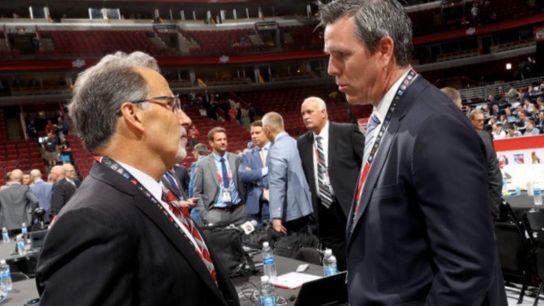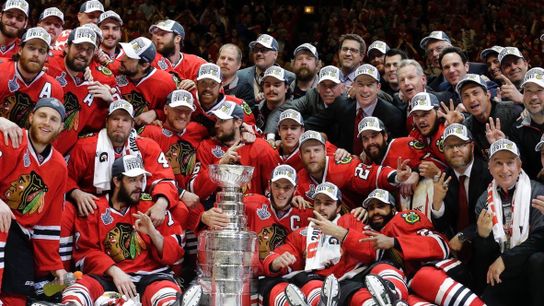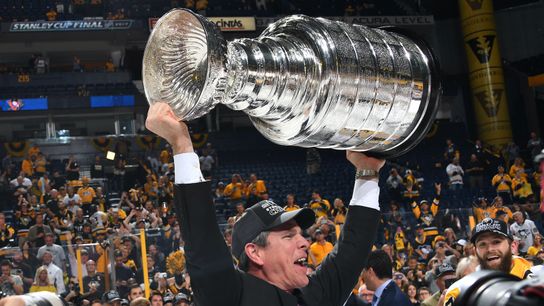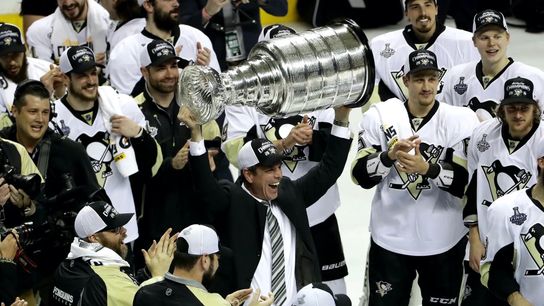Mike Sullivan savored his first Stanley Cup celebration from a respectful distance. Standing at ice level with the trophy being raised all around him, he was close enough to feel the radiating joy and sense of accomplishment that went into winning it.
But Sullivan made sure to stay on the periphery of the escalating festivities. He wanted the spotlight on the key figures most responsible for victory. So when it came time to take the most coveted team photo in hockey — players, coaches, managers and support staff crowding around the Cup — Sullivan steered clear of the camera lenses.
“It was an awesome experience,” he said. “I went on the ice, but I stayed very much on the perimeter. That’s the players’ time, that’s the coaches’ time, the ones that make all the sacrifices.”
For Penguins fans, the scene probably doesn’t jibe with jubilant memories of June 12, 2016 in San Jose when Sullivan led the franchise to a championship in his first season behind the bench. That’s because it’s not the celebration he’s describing. Sullivan was part of the Blackhawks’ hockey operations crew that helped the club win its third Cup in six seasons in 2015.
“I felt really good in some small way to make a contribution,” he said.
As Sullivan approaches his 500th game in charge of the Penguins, we often think of his coaching career in three segments: The early years with the Bruins, the eight-season stint alongside John Tortorella and the past seven campaigns in Pittsburgh, which includes back-to-back titles.
Often forgotten is one of the most pivotal and transformative seasons on Sullivan’s resume. It was the one spent in Chicago, where he learned to become a better coach and leader by not coaching or leading. He took an unconventional step back to serve on the Blackhawks’ player development staff, and also worked as an advance scout during the club’s playoff run.
Few coaches with so many years in the league would dare leave their chosen profession for fear of not being able to land the next job. There’s always another crop of bright, young coaches waiting to fill vacancies. Sullivan, however, believed that tackling different roles and challenges would help in his long-term goal of becoming an NHL head coach again.
He bet on himself — and the Penguins ended up winning the jackpot because of it.
Sullivan used his one-season hiatus from coaching to gain an understanding of how a three-time Stanley Cup champion created an identity and fostered expectations. He brought those lessons with him to the Penguins’ organization, first as its minor-league coach and then as a steadying influence for Sidney Crosby, Evgeni Malkin and Kris Letang.
“I have so much respect for the road Sully took,” Tortorella said. “A lot of coaches should take a minute and look what he did to get back to where he wanted to be. He was a grinder, and he did everything they asked him to do. It’s a story that deserves to be told.”
____________________

GETTY
John Tortorella and Mike Sullivan spent nearly a decade together behind NHL benches.
One of the NHL’s most amicable divorces occurred on May 1, 2014. It was the day the Canucks fired Tortorella as its head coach and Sullivan as one of its assistants. Hours after their dismissals, the longtime friends agreed it was best to split after nearly a decade together.
“I said, ‘Sully, if I’m fortunate enough to get another job, you can’t be my assistant anymore,’” recalled Tortorella, who led Tampa Bay to a Cup title in 2004. “We had to break. It was getting to the point where Sully was going to be labeled ‘an assistant,’ and he was way too good of a coach for that.”
The two sons of New England hockey, men driven by similar passion and values, had been discussing the topic for awhile.
It had been a decade since Sullivan last worked as a head coach with the Bruins for two years on either side of the 2004-05 NHL lockout. While others earned second chances, Sullivan routinely was passed over. It didn’t matter that he had played 11 seasons in the league and had guided Boston to a division title in his first year. Sullivan had become an extension of Tortorella.
Although they enjoyed a good run together, including a trip to the Eastern Conference finals with the Rangers in 2012, Sullivan was stung by their one-year flameout in Vancouver.
“When you invest the kind of energy that Torts and I did through the process to help our team be successful and you’re not successful, it wears on you,” Sullivan said. “At least it did on me. . . . I was so grateful for what I learned with Torts, but I felt like I needed to step away from him, step away from what I was doing to create my own autonomy as a coach.”
____________________

GETTY
Mike Sullivan was part of the 2015 Stanley Cup champion Blackhawks, but he didn't feel worthy of appearing in the team picture.
Stan Bowman felt it the first time he was in the company of Sullivan, interviewing him for the position of Blackhawks’ development coach in the summer of 2014. The feeling was unmistakable and Bowman wanted his prize prospects to experience it as well.
“Sully has a presence to him,” said the former Blackhawks general manager who assembled three Cup winners. “Whether it’s the tone of his voice or the way he carries himself, he’s got a presence. He looks like a guy you can rely on for good information.”
Bowman recognized the uncommon career path Sullivan was charting. Coaches who get fired usually take the next available job in that profession, even if it means sitting out a year to wait for the opportunity.
The son of legendary coach Scott Bowman preferred continuity when considering a hire for his development staff. He wanted his prospects hearing the same voice as they advance through the ranks. Stan Bowman was convinced Sullivan would return to coaching within two years, but he valued his attributes enough to give him the job.
The general manager was not disappointed.
“I think Sully is incredible; I think he’s the best coach around,” said Bowman, who resigned from the Blackhawks earlier this season amid allegations of sexual assault committed by a member of the team’s video coaching staff years ago and the coverup that followed.
Sullivan saw the Chicago opportunity as an immersive experience, a chance to gain a big-picture look into a perennial Cup contender.
He traveled the continent, watching the Hawks’ prospects play in the college and junior ranks. It was a good reminder to him of the process players go through in order to reach the NHL. Instead of coaching a cluster of forwards or a special-teams unit, Sullivan focused on building relationships and trust with individual youngsters and reporting back on their progress.
That was just part of his responsibilities, however. He pre-scouted Stanley Cup playoff opponents, identifying trends and weaknesses the Hawks might be able to exploit in the later round. Sullivan also participated in pro-scout meetings, where he was asked to give his opinion on players Chicago might acquire.
“Stan wanted me to sit in on some of those meetings, and in the first meeting I was sitting next to Scotty (Bowman), and I developed a relationship with him over the course of the year,” Sullivan said of the Hall-of-Famer who guided the Penguins to their 1992 title. “I just cherished that relationship and the discussions we had. I got to pick Scotty Bowman’s brain for an entire year.”
Among the most important experiences was getting a behind-the-curtain look at what Chicago valued in constructing a roster. The 2014-15 Blackhawks and the team Sullivan would inherit in Pittsburgh had similar compositions. A few superstars in Patrick Kane, Jonathan Toews and Duncan Keith surrounded by role players who understood their tasks.
“I’ve always been a believer that the best teams have a very distinct identity and that every player knows what his role is to contribute to that identity,” Sullivan said. “In watching Chicago that year, I thought they were terrific in that capacity and when I became the coach in Pittsburgh, I gave a lot of thought to that process. I talked to our guys — and I still do it to this day — about the Penguins’ identity. We call it 'Penguins hockey.'
“To a man, we communicate what everybody’s role is. Everyone’s in the locker room for a reason, everyone has to bring something to the table. As a coaching staff, we spend a lot of time communicating with our players on what the expectations are and how they can help us win.”
There was an added bonus to his season’s work with the Blackhawks. Because he rarely needed to be in Chicago, he lived in his native Massachusetts and spent more time with his wife and kids. Sullivan got to see his son, Matt, play hockey at Bowdoin College in between scouting trips to watch Blackhawks’ prospects.
“It was great,” Sullivan said. “It gave me an opportunity to connect with my family for longer periods, which is not as easy to do when you’re coaching every day.”
____________________

GETTY
Mike Sullivan lifted the Stanley Cup again with the Penguins in 2017.
Jim Rutherford met Sullivan for the first time in 2006 when the two men were cruising 30,000 feet above ground. It was an ideal setting for a general manager and coach who a decade later would reach dizzying heights together.
“We were on a plane headed to a draft somewhere,” the former Penguins GM recalled. “I introduced myself. Sully was in limbo waiting to see if he was going back to Boston. I told him I thought he had done a terrific job and hoped the Bruins had recognized that.”
When Sullivan’s name appeared on Jason Botterill’s list of coaching candidates for the Wilkes-Barre/Scranton opening in 2015, Rutherford was intrigued. He wanted a coach with NHL experience, and Sullivan offered plenty of it.
Rutherford didn’t care he had spent the previous season evaluating Blackhawks’ prospects and filing scouting reports from Stanley Cup playoff games. But would Sullivan, who was 47-year-old at the time, want to go back to riding busses through the American Hockey League?
“This is what’s so cool about Sully,” Tortorella said. “There is no ego there. He wasn’t this highfalutin ex-player and ex-head coach who had done minor-league coaching early in his career and wasn’t going to do it again. He just started grinding away.”
Rutherford watched Sullivan closely during the 2015 Penguins’ training camp. He saw the work ethic and the focus, the willingness to raise his voice and hold players accountable.
Sullivan knew if he had any chance of attaining his ultimate goal, he would have to impress in his second minor-league stint.
“Nobody has a crystal ball,” Sullivan said. “You’re not sure if you’re going to get the opportunity again (to coach in the NHL) and, to a certain extent, I was taking a leap of faith. I had to believe that I was a capable person, and I wanted to give myself the best opportunity and I thought taking that job was necessary.”
The Baby Penguins started quickly, and when the varsity club struggled under the command of Mike Johnson, Rutherford didn’t hesitate in promoting Sullivan at midseason. Recalling the lessons learned in Chicago, he went about fortifying the core with minor league call-ups such as Bryan Rust and Conor Sheary, who added to the club’s identity as valuable role players. There also was goaltender Matt Murray, who Sullivan trusted in the postseason even after Marc-Andre Fleury returned from injury.
For a second consecutive year, Sullivan was on the ice for a Stanley Cup celebration, only this time his face featured prominently in the team photo.
“He’s a huge part of the success in Pittsburgh,” Bowman said. “I have so much respect for the job he’s done there with a revolving cast of characters. The big stars are still there, yet there’s a lot of different players on that team from just five years ago. He’s found other guys to thrive in his system.”
Much like former Blackhawks coach Joel Quenneville, Sullivan has built strong relationships with his elite players, who set the standard for others.
“Star players are not always easy to coach,” Bowman said. “Look around the league and the teams that win are the ones whose coaches find a method to make their most talented players become their best players. Jon Cooper has done it. Joel did that with us and Sully has done it in Pittsburgh.”
While his one season with the Blackhawks is a mere footnote to many fans, Sullivan acknowledges the importance of his career reset in Chicago.
“I needed to take a step back to take a step forward,” he said. “To me, it boiled down to doing what it takes. That was an invaluable experience.”
One that continues to benefit the Penguins seven years later.
